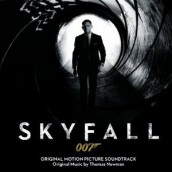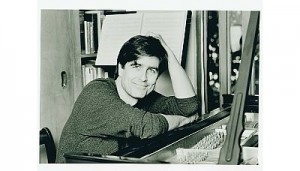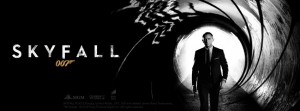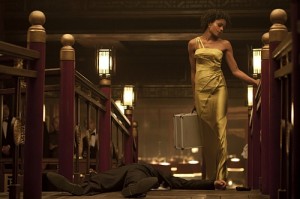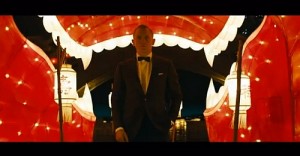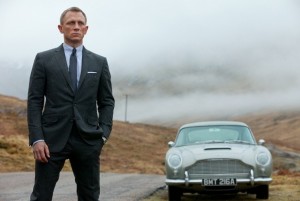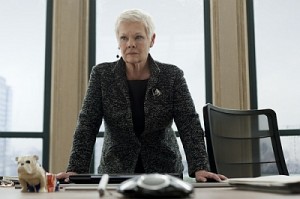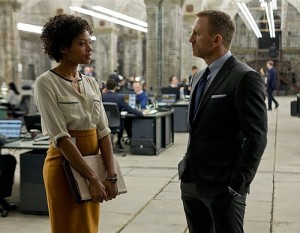As James Bond gun-barrels hell-bent into the 21st century with his 23rd film SKYFALL, 007’s owners have continued to re-shape their iconic 50 year-old bread-and-Broccoli character into a spy who’s far more a part of a believable BOURNE universe, as opposed the stylish wisecracker who duked it out with evil industrialists aboard super tankers and space stations. While that gallows humor is still very much part of Bond’s DNA, the character has achieved a real-world level of brute force and inner turmoil unheard of in his past incarnations. But even before the real world makeover that’s best been personified by Daniel Craig, 007’s music has strived to stay in tune with modern musical tastes. The soundtrack variations have included the positively relaxed jazz-action approach of John Barry, George Martin’s Afro-funk, the disco-style heroics of Marvin Hamlisch and Bill Conti, the appalling Euro beat of Eric Serra and most recently David Arnold’s electrifying mash up Barry’s now old-school orchestrations and his biggest fan’s rock-pop pulse.
Now James Bond’s music has taken on board perhaps its most interesting agent provocateur by giving Thomas Newman a license to score. A composer who’s somehow managed to walk the Hollywood line between indie experimentalism and studio conformity, Newman has never lost the alt. edge that’s made him the most musically progressive member of his family’s film scoring dynasty, especially with such breakout scores as DESPERATELY SEEKING SUSAN, THE LOST BOYS and THE RAPTURE. Yet his father Alfred’s robustly melodic symphonic spirit has very much flowed through Thomas’ bloodline in scores to LITTLE WOMEN, THE SHAWSHANK REDEMPTION and THE GOOD GERMAN. But if there was one genre that Newman barely hit through the years, it’s been action, with recent scores for THE ADJUSTMENT BUREAU and THE DEBT showing off the rhythmic possibilities he might give a balls-out car chase, a fight atop a train or a gun battle inside a government building.
Thanks to SKYFALL, Thomas Newman gets to engage in all three, and many more action sequences, all with a particular debt to filmmaker Sam Mendes, whom the composer has worked before with scores like AMERICAN BEAUTY, ROAD TO PERDITION and JARHEAD.The result of the confidence of a director who brings equally eccentric energy to his work has allowed Newman to engage in a crazy-quilt of his greatest hits for SKYFALL, among them from the rock rhythms of ERIN BROKOVICH, the eerie orchestrations of THE GREEN MILE and the lush romance of MEET JOE BLACK, with even FINDING NEMO‘s perky comedy thrown in for good measure. It’s a thoroughly engaging Newman mix tape, as uniquely heard for a Bond mission that starts big and ends relatively small. Even cooler yet, his SKYFALL more than acknowledges the many of the composing styles that have come before, incorporating the famed theme, lush jazz swagger and Vic Flick guitar stylings in a way that will please both purists and Discman-wearing newcomers to the franchise. For a Bond that holds more surprises than most, Thomas Newman’s score is one of “Skyfall’s” most impressive, and wackiest weapons in a musical cannon that’s never been afraid to go for the shot.
ASSIGNMENT X: In your wildest dreams did you ever imagine you’d be scoring a big action movie, let alone a James Bond picture?
THOMAS NEWMAN: I guess the answer to that would be ‘No.’ I don’t think I ever thought about it. Action scores speak with a muscularity and strength that had to be heard next to tire screeches and gunshots and things of that nature. So even though I enjoy action movies, it’s not like scoring an action movie was ever a thought of mine, especially because one’s personal voice was less likely to come out because of those kinds of requirements. I’d never really thought about doing a Bond movie until I heard that Sam Mendes was directing one. So I thought I’d be brave and give him a holler to say that I’d love to work on it with him if he would have me. But I also didn’t want to be pushy about it. And it turned out that Sam had already been thinking about calling me to see if we could make SKYFALL happen together.
AX: Did Sam have to fight to get you the gig, especially as you didn’t have a lot of action movies on your resume?
NEWMAN: I don’t know. You’d have to ask him that. Barbara Broccoli and Michael Wilson loved working with David Arnold on the last several Bond scores, and wanted to make sure I was the right guy in their mind, and that they could get along with me. So they made sure to come to see me in Los Angeles before hiring me. I enjoyed meeting them, and that was about it.
AX: The Broccoli family has a legendary level of control over the franchise. How much of that did you feel during the scoring process, or did Sam keep you separate from it?
NEWMAN: Sam sheltered me up to the point of the recording sessions, which the Broccolis were present for. They were not shy to speak up. But in fairness to them and Sam, the communication was always through Sam in the recording environment.
AX: Did it always go smoothly with the Broccolis?
NEWMAN: I think it did go smoothly. They’re kind and good people. Obviously, they’re not going to stop until they get what they want, but they were never ferocious about it. They were always very respectful of me, even if they weren’t going to be shy about making sure I understood any issues they may have had.
AX: What has James Bond meant to you, and what do you think the responsibilities are of scoring such an iconic franchise?
NEWMAN: While I wasn’t a rabid fan of James Bond movies when growing up, I really loved watching them. Now there’s obviously a huge amount of expectation in terms of what a “James Bond score” is. Everybody has an opinion on Bond, and his music. But I really didn’t feel an obligation to meet up to these expectations. Or if I was going to defy them, I wanted to defy them in a way that was pleasing and compelling as opposed to making people feel that I was doing something different for it’s own sake.
AX: As one of Hollywood’s more experimental composers, how “far out” did you think you could go with SKYFALL’s score?
NEWMAN: You have ideas, and you see if they fly. In the case of the action, there was so much going on sonically that I wondered how much space was left to hear the intricacy, and detail in the manner that I’ve scored films with before. So at the very least, I knew that sounds really needed to hit the subwoofers to really hit the audience physically. So I think I recognized that I’d have to be more extroverted with SKYFALL‘s score then maybe I’m used to being.
AX: While the musical voice is most definitely your own in SKYFALL, you can still hear the styles that such past composers as John Barry and David Arnold brought to Bond. Did you want to make a point of capturing those past styles?
NEWMAN: It’s not like I set out to study the past Bond scores. I watched some of the movies, and had general notes and impressions about how the music was operating. But after that, I didn’t want to be too studious about it all. I thought that would be intimidating, and suppressing any ability I might have to be creative in my own right. But maybe butting up against those past scores kind of rubbed off on me a bit.
AX: Yet the main theme in the film is essentially the classic James Bond melody.
NEWMAN: I guess that’s appropriate, right? It’s a great, iconic and satisfying theme to so many people, especially the fans. I definitely wanted to use it. The issue was when and where, and Sam and I, with the help of Barbara Broccoli and Michael Wilson, talked about where we should evoke the Bond theme.
AX: The Adele theme song is only reflected in the cue “Komodo Dragon.” Did you want to incorporate it anywhere else in the score?
NEWMAN: Michael Wilson had asked where I was going to use the Adele song so that it didn’t appear as a kind of “one off” at the top of the movie. And the scene where he enters the Macau casino with his new, shaved appearance and tuxedo was a real moment of “Bond” swagger. The Adele tune has that quality to it too, so that seemed like a good place to reprieve the song.
AX: Did you have any interaction with Adele or the writers of the song?
NEWMAN: While I did not get to meet with Adele, I did with Paul Epworth, who was the co-writer and producer of the song, He really wanted to evoke the early Shirley Bassey arrangements with SKYFALL, and talked to me about arranging the strings and brass to that effect But my task was already so huge and daunting that my orchestrator J.A.C. Redford, who’s a great composer in his own right, ended up doing the arrangements.
AX: The film you scored before SKYFALL was THE IRON LADY, which dealt with Margaret Thatcher’s imperious rule of England’s government. Do you have any similarities between her and M?
NEWMAN: That’s interesting. I guess there’s a certain stoic nature to English behavior, a kind of stiff upper lip. That was obvious in the case of Margaret Thatcher, and also in the case of M. Their music couldn’t be overly sentimental or emotional. And if they were being emotional, then the score had to allow for that without directly “speaking” for their feelings. I think that kind of character gives strength to the way I musically depicted them.
AX: Javier Bardem’s Silva is my favorite character in the film, especially because he’s just might be the craziest Bond villain the series has had. Do you think your naturally offbeat character is particularly well suited to him?
NEWMAN: You know, I never thought of it that way. There was so much quirkiness in Silva’s personal choice of music that it occurred to me that my sense of his character would be more wrapped up in his unfolding story.
AX: You’ve got a lush approach for the femme fatale character of Severine.
NEWMAN: That’s because I probably wanted to evoke as much of a John Barry’ish type of melody for her as I could find, which meant using a major-minor theme, something that had sexuality and danger as mixed with a certain level of satin loveliness.
AX: I think you’re one of the few composers to write a comedy cue for James Bond with “Close Shave.”
NEWMAN: That was a tough scene for Sam because we’re still figuring out what the Bond and his fellow agent Eve is. The scene’s dangerous, sexy and had a level of humor. I ended up doing many different versions of it because the cue kind of came late in late during our process. I’d spent some time on the podium refining a take on “Close Shave” that Sam was very high on. Or at least I thought he was until he rejected it a few minutes later!
AX: What didn’t work about your first “Close Shave?”
NEWMAN: I think my first approach, was a kind of classical in its sexiness, and Sam was wondering if the music was saying the wrong thing, or it was saying too much and tipped this kind of balance in what Bond and Eve’s relationship was.
AX: Was the rest of the score relatively easy? Or were there a lot of changes like that?
NEWMAN: There were tough moments and areas that needed to be re-examined, and in some cases re-written. But that’s no different then any other movie where something is accepted on a Monday and rejected on a Thursday.
AX: What do Sam’s sensibilities as a director bring to SKYFALL?
NEMAN: Sam’s great with character, obviously, and had a fundamental understanding of Bond. So I think it was a perfect storm of him really wanting to respect the character and the franchise while wanting to make the story more compelling, and more evolving.
AX: How do you think that “English” quality rubs off on the score?
NEWMAN: SKYFALL is very much an English movie. I felt the same way when doing THE BEXT EXOTIC MARIGOLD HOTEL in a way, which is for me to think, “What’s a yank doing on a movie like this?” I was over in London for three and a half months on SKYFALL, did nearly all of the writing over there. It was a really different experience for me in many ways to have an office at Abbey Road studios, composing morning, noon and night, and then to have the score performed there. The musicians are so fantastic as well in England. There’s a real sense of ensemble on the way the orchestra plays. It’s a great town musically.
AX: Were you ready for SKYFALLS’ rave reviews, some of which say that it’s the best Bond movie since GOLDFINGER?
NEWMAN: I always thought it was a good movie. I really enjoyed it when I first saw it. In terms of reviews and people liking it it’s really a wonderful thing to happen at the end of this arduous process.
AX: What kind of doors do you think that SKYFALL is going to open up for you in terms of people who may have thought Thomas Newman couldn’t score an action film?
NEWMAN: I don’t know. I try not to think on that level. What’s fun is to think I can take action films on and handle them, that I can be chameleonic in a way. It’s always a great thing to defy expectations. It’s been such a high point in my career to work with Sam on this film. He tends to bring good work out of me. But then, he kind of expects it and won’t stop until he gets it. So it hurts, but it always rewards, especially with SKYFALL.
AX: Do you think of SKYFALL as your biggest score yet?
NEWMAN: I never thought of it that way. What’s funny is how much visibility scoring a Bond film has. The Pixar movies I score like FINDING NEMO and WALL-E become known when they’re completed, but typically not before they are completed. Me scoring SKYFALL has become a much bigger deal then I would have thought.
Clink on the link to buy the SKYFALL soundtrack
Related: Movie Review: SKYFALL
AGREE? DISAGREE? LET YOUR VOICE BE HEARD – COMMENT BELOW
Follow us on Twitter at ASSIGNMENT X
Fan us on Facebook at ASSIGNMENT X
Article Source: Assignment X
Article: Interview with SKYFALL composer Thomas Newman
Related Posts:




